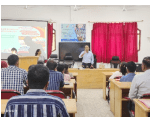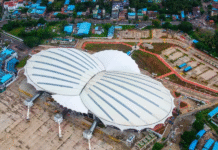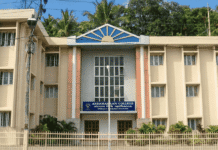A one-day UT-level workshop on PARAKH Rastriya Sarvekshan 2024 and the implementation of the Holistic Progress Card was conducted at the Conference Hall of Shiksha Sadan, Sri Vijaya Puram, bringing together educators and administrators from across the Andaman & Nicobar Islands. Organised under the aegis of PARAKH, NCERT, the event aimed to review the educational assessment outcomes from the PRS 2024 and to develop actionable strategies for improving student learning and overall school performance.
The workshop was inaugurated by the Director of Education, who emphasised the importance of timely dissemination of PARAKH results across all levels of the education system. He underlined that the findings from PRS 2024 provide critical insight into areas of strength and those requiring targeted interventions. He called for a renewed focus on academic activities to achieve measurable improvements in outcomes and to ensure that the developmental needs of students are met comprehensively.
Adding a national perspective to the proceedings, Professor Indrani Bhaduri, Head of the Educational Survey Division at the National Council of Educational Research and Training (NCERT) in New Delhi, addressed participants virtually. She commended the administration for its performance in the Grade 3 foundational stage and acknowledged the efforts of teachers, administrators, and support staff in achieving the reported progress.
The workshop sessions covered detailed presentations on key PRS 2024 documents, including state and district report cards. Facilitators walked participants through contextual factors influencing student performance, such as local socio-economic conditions, infrastructure availability, and teacher-student ratios. The emphasis was on ensuring that these reports translate into concrete, localised action plans that can be implemented at the school and zone level.
Participants engaged in knowledge-sharing sessions, exchanging innovative ideas and best practices from their respective zones. Discussions centred on practical strategies for the adoption of holistic progress cards, which go beyond traditional examination scores to assess a student’s overall development, including cognitive, socio-emotional, and physical growth. The holistic approach aligns with the objectives of the National Education Policy, seeking to equip learners with skills and values for life beyond the classroom.
A dedicated brainstorming segment addressed the need for robust monitoring mechanisms. Participants explored ways to track implementation progress, measure effectiveness, and ensure accountability at every administrative level. Suggestions included periodic audits, teacher capacity-building workshops, and enhanced use of digital tools for real-time monitoring.
The interactive nature of the workshop allowed educators to voice challenges faced in implementing assessment reforms in geographically dispersed island communities. Issues such as resource constraints, transport limitations, and the need for customised learning materials for island-specific contexts were discussed, with consensus on the necessity of adaptive strategies.
In the valedictory session, certificates of participation were awarded to attendees, recognising their contribution to the knowledge exchange process. Organisers noted that the workshop’s outcomes would feed into a broader action plan for educational quality improvement in the territory.
The PARAKH initiative, Performance Assessment, Review, and Analysis of Knowledge for Holistic Development, seeks to bring uniformity, reliability, and depth to educational assessment in India. In the Andaman & Nicobar Islands, the application of its methodologies holds particular significance given the diversity of communities, the logistical challenges of delivering education across multiple islands, and the need to ensure equitable access to quality learning opportunities.
By focusing on both analytical review and forward-looking strategies, the workshop reinforced the territory’s commitment to elevating learning outcomes and aligning its educational framework with national benchmarks. The collaborative energy of the event underscored the shared objective of preparing students not just for examinations, but for meaningful participation in the nation’s future.





